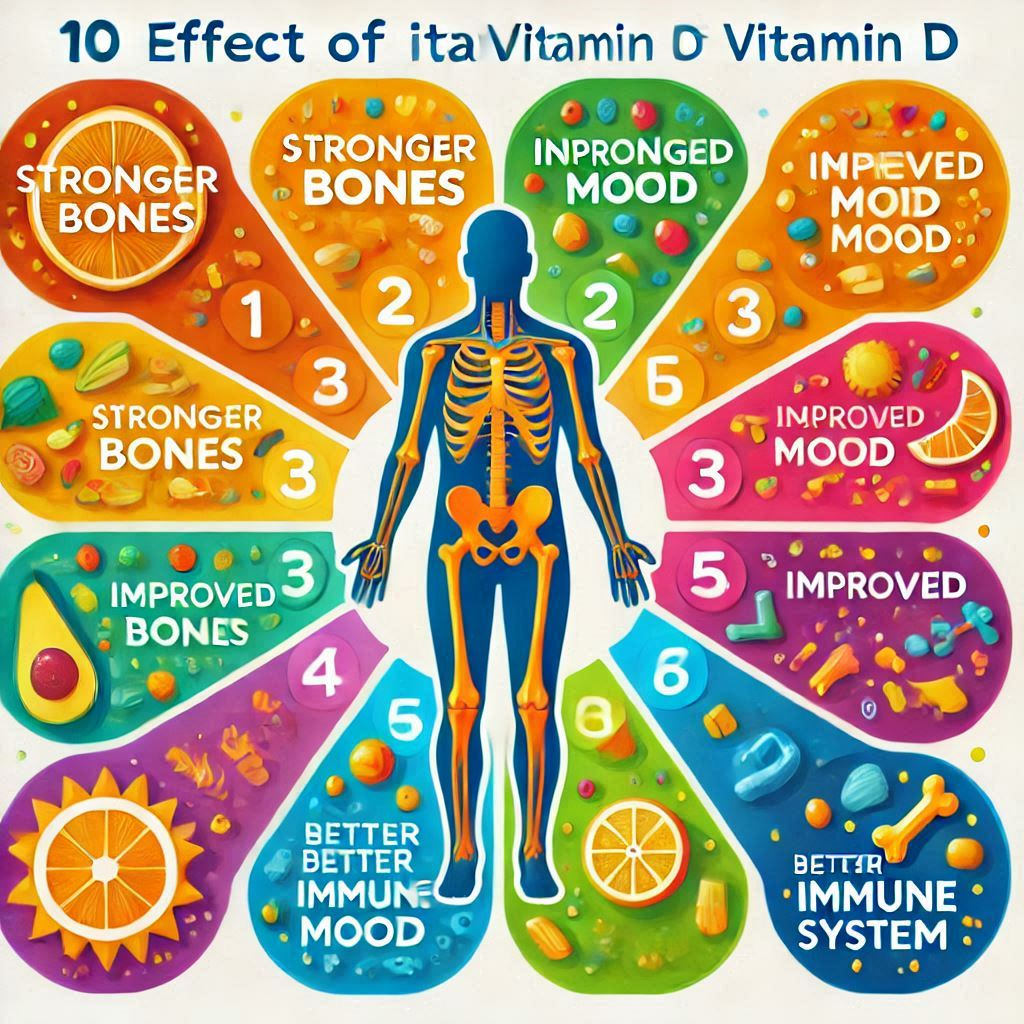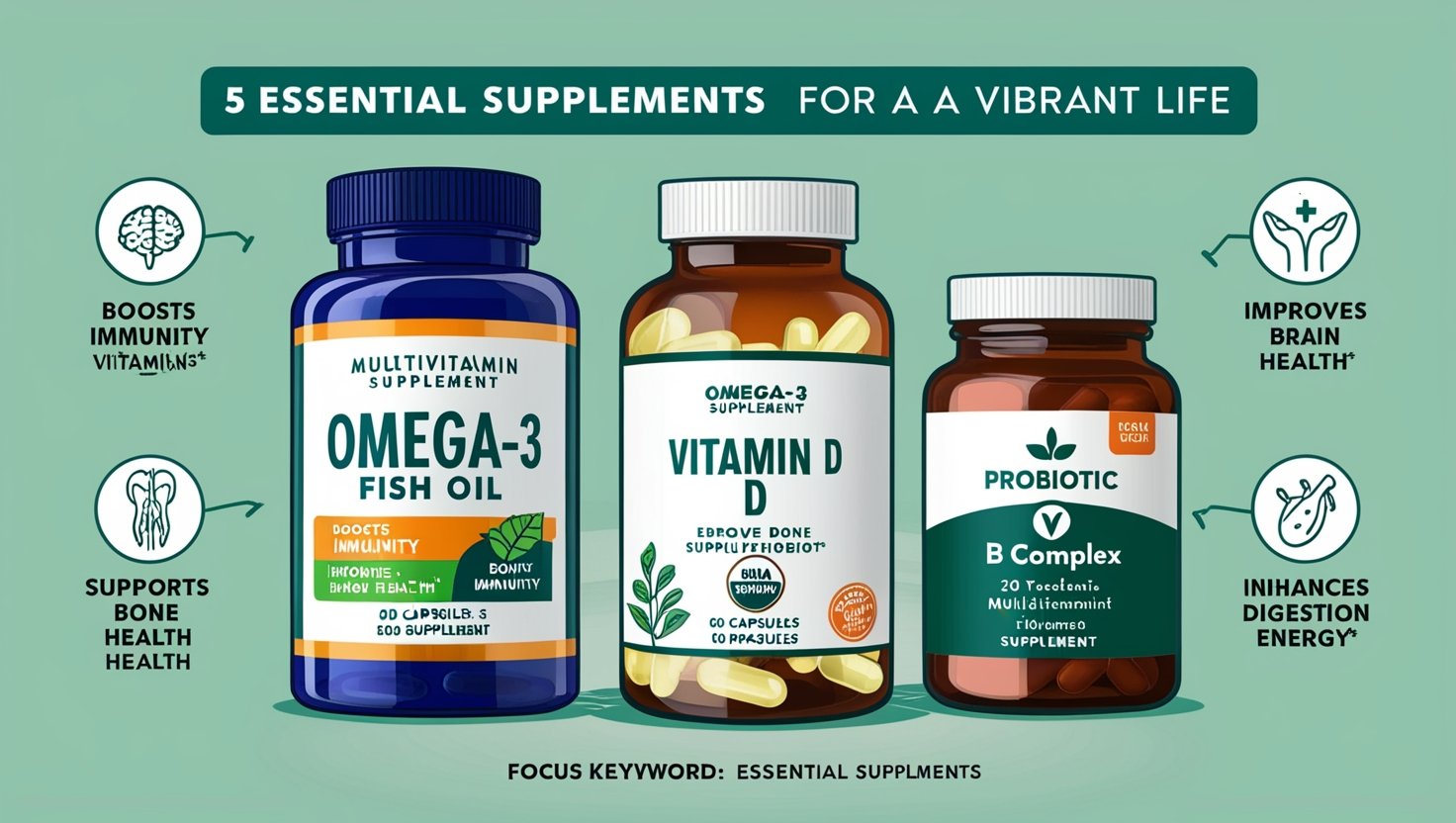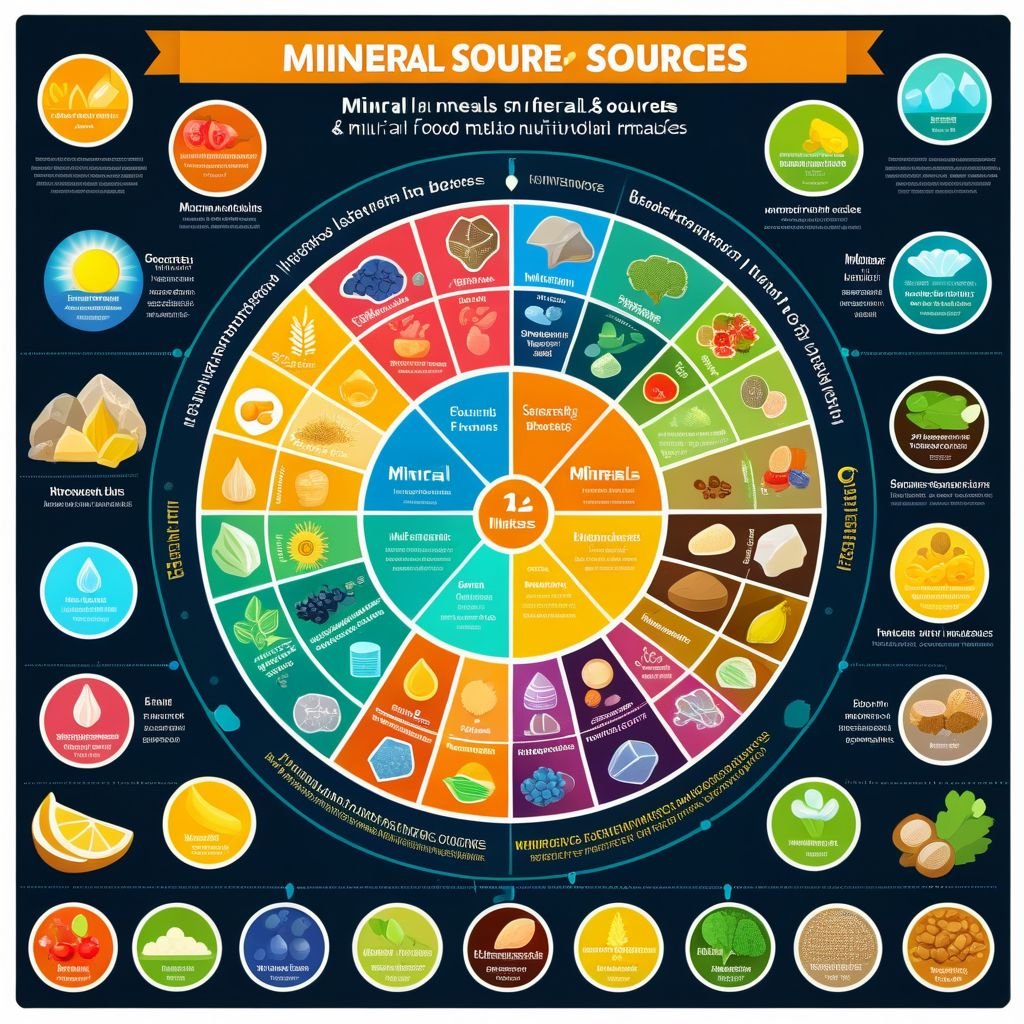
12 Fabulous Energy and Wellness Minerals!
12 Fabulous Energy and Wellness Minerals!
Discover 12 fabulous energy minerals that rapidly boost energy and overall well-being for a healthier lifestyle.
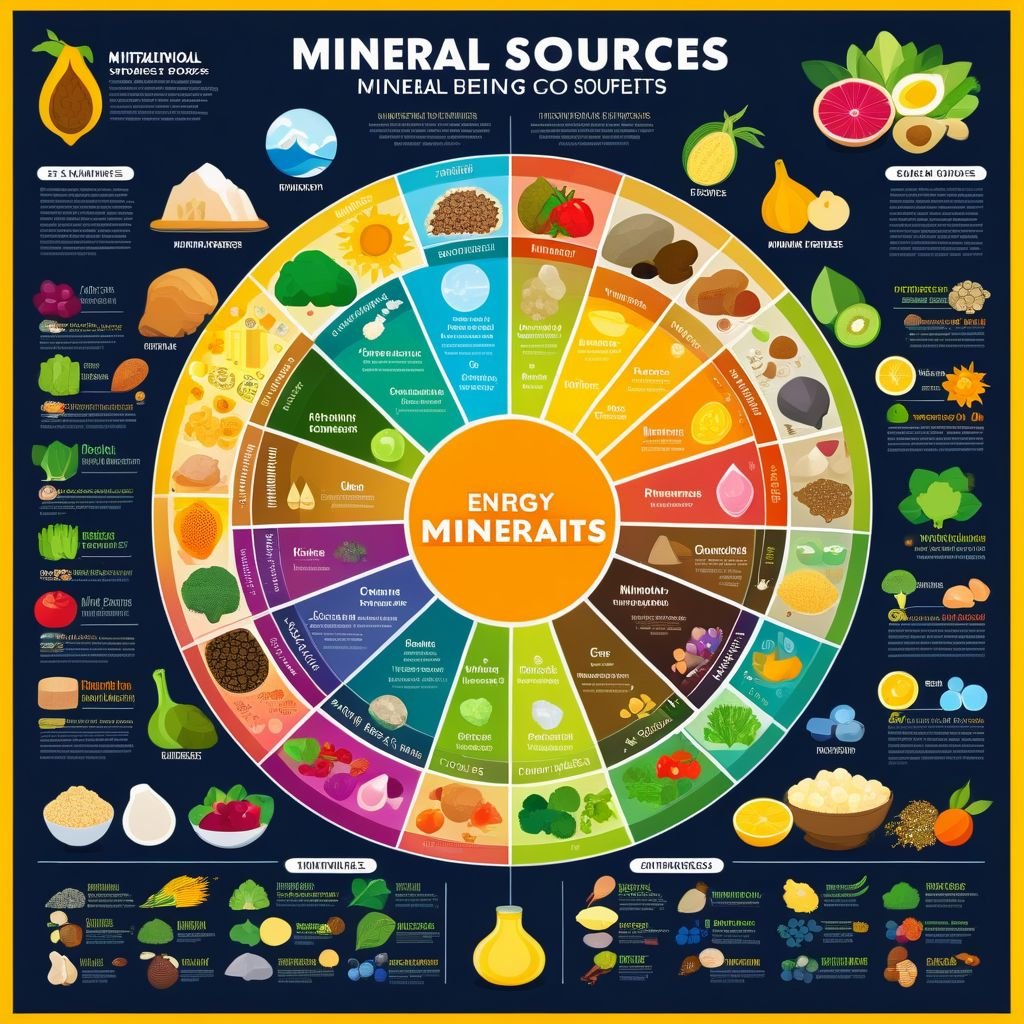
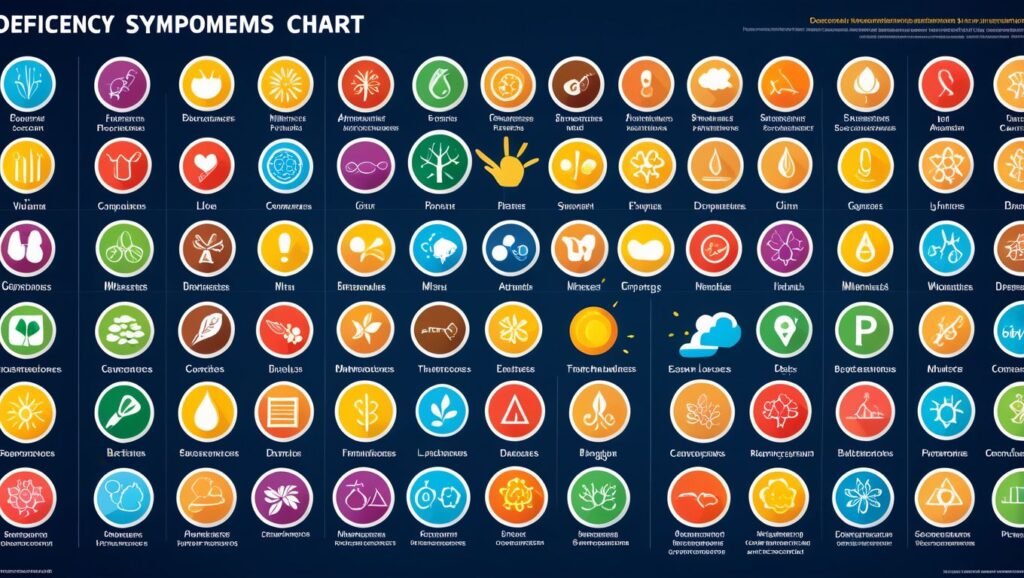
Introduction
Minerals are essential nutrients that play a crucial role in maintaining various physiological functions in the human body. Unlike vitamins, which are organic compounds, minerals are inorganic elements that originate from the earth and are absorbed by plants and animals. These nutrients are vital for numerous bodily functions, including bone health, fluid balance, nerve transmission, and muscle function.
In particular, minerals are fundamental to energy production and overall well-being. They act as cofactors in enzymatic reactions, facilitating the conversion of food into usable energy. Without adequate mineral intake, the body may struggle to perform optimally, leading to fatigue, weakness, and a host of other health issues. Understanding the importance of minerals can empower individuals to make informed dietary choices that enhance their energy levels and promote overall health.
Read also: The Amazing 10 Effects of Vitamin D
II. The Role of Minerals in Energy Production
A. How Minerals Aid in Metabolic Processes
Metabolism refers to the myriad biochemical reactions that occur within the body to maintain life. These processes can be broadly categorized into two types: catabolism (breaking down molecules to release energy) and anabolism (building up molecules for growth and repair). Minerals are integral to both of these processes, as they serve as essential cofactors for various enzymes involved in metabolic pathways.
For instance, magnesium plays a pivotal role in over 300 enzymatic reactions, many of which are involved in energy metabolism. It helps convert glucose into energy and is necessary for the synthesis of adenosine triphosphate (ATP), the primary energy carrier in cells. Similarly, zinc is crucial for the functioning of enzymes that facilitate the breakdown of carbohydrates and fats, further supporting energy production.
Additionally, minerals such as iron are vital for the synthesis of hemoglobin, the protein in red blood cells responsible for transporting oxygen throughout the body. Adequate oxygen supply is essential for efficient energy production, particularly during physical activity. Therefore, a deficiency in these key minerals can hinder metabolic processes, leading to decreased energy levels and overall vitality.
B. Importance of Minerals in Cellular Energy Production
At the cellular level, energy production primarily occurs in the mitochondria, often referred to as the “powerhouses” of the cell. This process, known as cellular respiration, involves the conversion of nutrients—primarily carbohydrates, fats, and proteins—into ATP. Minerals play a critical role in this process by facilitating key reactions and ensuring the efficient functioning of cellular components.
- Calcium: This mineral is crucial for the release of energy from ATP. It acts as a signaling molecule that triggers various cellular processes, including muscle contractions and neurotransmitter release. A proper balance of calcium is essential for optimal energy utilization in muscle cells, particularly during exercise.
- Iron: As mentioned earlier, iron is indispensable for oxygen transport. Oxygen is a critical component of aerobic respiration, a process that generates a significant amount of ATP. Without sufficient iron, the body may experience reduced oxygen-carrying capacity, leading to fatigue and decreased energy levels.
- Phosphorus: This mineral is a key component of ATP itself. Phosphorus is involved in the phosphorylation process, where phosphate groups are added to molecules to store and release energy. It is also crucial for the formation of nucleic acids, which are essential for cellular growth and repair.
- Selenium: This trace mineral plays a role in the antioxidant defense system, protecting cells from oxidative stress that can impair energy production. By maintaining cellular health, selenium supports efficient metabolic processes.
In summary, minerals are not just essential for maintaining basic bodily functions; they are integral to the complex processes that generate energy at the cellular level. Ensuring an adequate intake of these vital nutrients is crucial for sustaining energy levels, enhancing physical performance, and promoting overall well-being. A balanced diet rich in various minerals can help individuals harness their full potential, leading to improved health and vitality.

III. List of 12 Incredible Minerals
1. Iron
- Role: Essential for oxygen transport in hemoglobin and myoglobin, iron plays a crucial role in energy production and metabolism.
- Sources:
- Red meat (beef, lamb)
- Beans (lentils, chickpeas)
- Spinach and other leafy greens
2. Magnesium
- Role: Vital for muscle function, nerve transmission, and energy production. Magnesium also helps regulate blood sugar levels and supports bone health.
- Sources:
- Nuts (almonds, cashews)
- Whole grains (brown rice, quinoa)
- Leafy greens (kale, spinach)
3. Calcium
- Role: Key for muscle contractions, nerve signaling, and the release of hormones. Calcium is also crucial for maintaining strong bones and teeth.
- Sources:
- Dairy products (milk, cheese, yogurt)
- Fortified plant milks (almond, soy)
- Leafy greens (collard greens, bok choy)
4. Potassium
- Role: Important for nerve function, muscle contraction, and maintaining fluid balance in the body. Potassium helps regulate blood pressure and supports heart health.
- Sources:
- Bananas
- Oranges
- Potatoes (especially with the skin)
5. Zinc
- Role: Plays a vital role in immune function, wound healing, and protein synthesis. Zinc is also important for DNA synthesis and cell division.
- Sources:
- Meat (beef, pork)
- Shellfish (oysters, crab)
- Legumes (chickpeas, lentils)
6. Copper
- Role: Essential for iron absorption and the formation of red blood cells. Copper also plays a role in energy production and maintaining healthy connective tissues.
- Sources:
- Shellfish (oysters, lobster)
- Nuts (cashews, almonds)
- Seeds (sunflower seeds)
7. Manganese
- Role: Involved in antioxidant function, bone formation, and metabolism of carbohydrates and fats. Manganese also supports brain health and wound healing.
- Sources:
- Whole grains (brown rice, oats)
- Nuts (pecans, hazelnuts)
- Leafy vegetables (spinach, kale)
8. Selenium
- Role: Important for thyroid function, selenium acts as an antioxidant and helps protect cells from damage. It also plays a role in immune response and reproduction.
- Sources:
- Brazil nuts (one of the richest sources)
- Seafood (tuna, shrimp)
- Eggs
9. Phosphorus
- Role: Key for energy storage and release, phosphorus is a component of ATP (adenosine triphosphate), the energy currency of cells. It also supports bone and teeth health.
- Sources:
- Meat (chicken, beef)
- Dairy (milk, cheese)
- Nuts (almonds, sunflower seeds)
10. Iodine
- Role: Essential for the production of thyroid hormones, which regulate metabolism, growth, and development. Iodine deficiency can lead to thyroid disorders.
- Sources:
- Iodized salt
- Seafood (fish, seaweed)
- Dairy products
11. Chromium
- Role: Enhances insulin sensitivity and plays a role in carbohydrate, fat, and protein metabolism. Chromium may help regulate blood sugar levels.
- Sources:
- Meat (beef, chicken)
- Whole grains (barley, oats)
- Fruits (apples, bananas)
12. Boron
- Role: Supports bone health, enhances the body’s use of estrogen, and may improve cognitive function. Boron also plays a role in energy levels and metabolism.
- Sources:
- Fruits (apples, pears)
- Nuts (almonds, walnuts)
- Vegetables (broccoli, carrots)
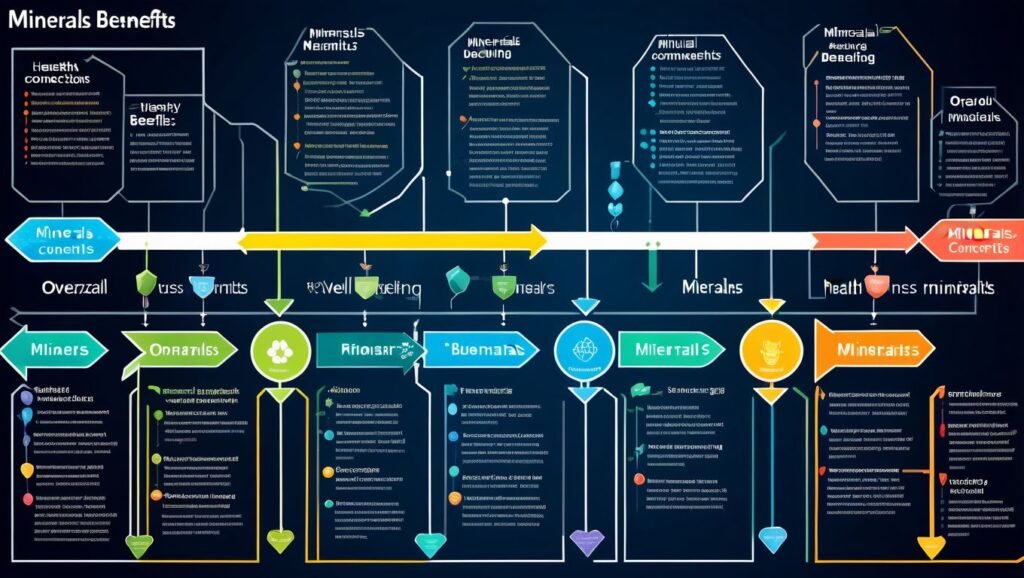
IV. Recognizing Mineral Deficiencies
Common Signs and Symptoms of Mineral Deficiencies
Minerals play a crucial role in various bodily functions, and deficiencies can lead to a range of health issues. Here are some common signs associated with deficiencies in specific minerals:
1. Iron Deficiency
- Symptoms: fatigue, weakness, pale skin, shortness of breath, dizziness, and cold hands and feet.
- Importance: Iron is vital for hemoglobin production, which carries oxygen in the blood.
2. Calcium Deficiency
- Symptoms: muscle cramps, numbness in fingers, brittle nails, and increased risk of osteoporosis.
- Importance: Calcium is essential for bone health, muscle function, and nerve signaling.
3. Magnesium Deficiency
- Symptoms: muscle twitches, cramps, mental disorders, osteoporosis, and fatigue.
- Importance: Magnesium is involved in over 300 biochemical reactions, including energy production and muscle contraction.
4. Zinc Deficiency
- Symptoms: weakened immune response, hair loss, delayed wound healing, and loss of taste or smell.
- Importance: Zinc is crucial for immune function, protein synthesis, and DNA synthesis.
5. Potassium Deficiency
- Symptoms: weakness, fatigue, muscle cramps, and irregular heart rhythms.
- Importance: potassium helps regulate fluid balance, muscle contractions, and nerve signals.
6. Selenium Deficiency
- Symptoms: fatigue, weakened immune system, and cognitive decline.
- Importance: Selenium is important for antioxidant defense and thyroid function.
Importance of a Balanced Diet
A balanced diet is essential for providing the body with the necessary vitamins and minerals. Here’s why a well-rounded diet is important:
- Optimal Functioning: Each mineral plays a unique role in bodily functions, from maintaining bone health to supporting metabolic processes.
- Disease Prevention: Adequate mineral intake can help prevent chronic diseases, including heart disease, osteoporosis, and anemia.
- Energy Levels: Minerals are vital for energy production; deficiencies can lead to fatigue and decreased performance.
- Mental Well-being: Certain minerals, like magnesium and zinc, are linked to mood regulation and cognitive function.
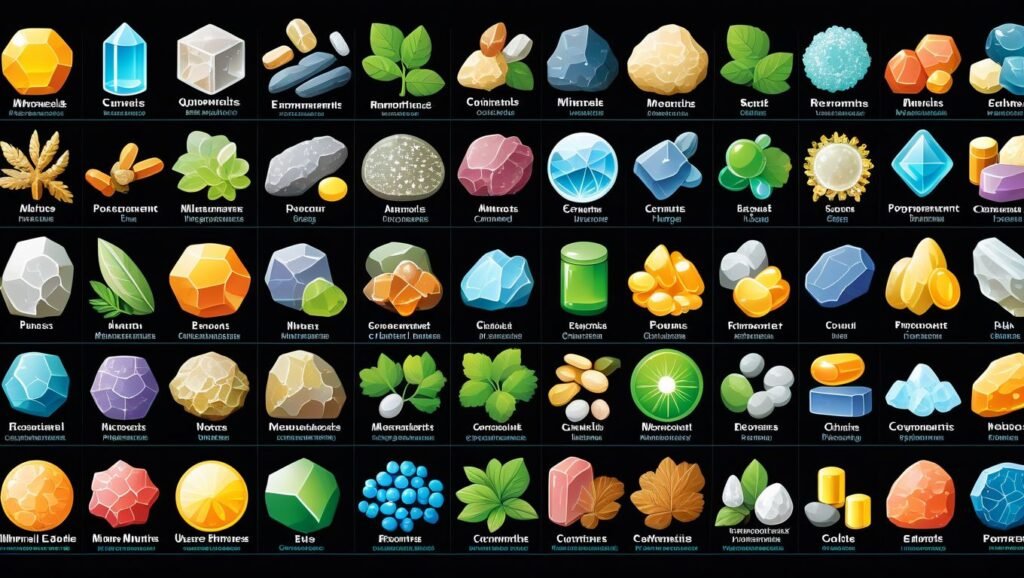
V. Tips for Incorporating Minerals into Your Diet
Practical Advice on Including Minerals in Daily Meals
Integrating minerals into your diet can be simple and enjoyable. Here are some practical tips:
1. Diverse Food Choices
- Fruits and vegetables: Include a variety of colorful fruits and vegetables. Leafy greens (spinach, kale) are rich in iron and calcium, while bananas are high in potassium.
- Whole Grains: Opt for whole grains like brown rice, quinoa, and oats, which are good sources of magnesium and iron.
- Nuts and Seeds: Almonds, pumpkin seeds, and sunflower seeds provide zinc and magnesium.
2. Protein Sources
- Meat and Fish: Lean meats, poultry, and fish (especially fatty fish like salmon) are excellent sources of iron and selenium.
- Legumes: Beans, lentils, and chickpeas are not only high in protein but also rich in iron and magnesium.
3. Dairy and Alternatives
- Dairy Products: Milk, yogurt, and cheese are great sources of calcium. If lactose-intolerant, consider fortified plant-based alternatives.
- Fortified Foods: Look for cereals and breads fortified with essential minerals.
4. Cooking Methods
- Steaming and Roasting: These methods help retain the mineral content in vegetables better than boiling.
- Avoid Excess Salt: High sodium intake can lead to potassium loss, so use herbs and spices for flavor instead.
Suggestions for Supplements if Necessary
While a balanced diet should ideally provide all necessary minerals, supplements can be beneficial in certain situations:
- Multivitamins: A good-quality multivitamin can fill in nutritional gaps.
- Specific Mineral Supplements: Consider supplements for specific deficiencies, such as iron or calcium, but consult with a healthcare provider first.
- Herbal Supplements: Some herbs may enhance mineral absorption; for example, nettle leaf is rich in iron.
VI. Conclusion
In summary, minerals are essential for maintaining energy levels, supporting bodily functions, and promoting overall well-being. Recognizing the signs of mineral deficiencies is crucial for taking proactive measures to address them.
Key Takeaways:
- Balanced Diet: A mineral-rich diet is vital for health and disease prevention.
- Incorporation Strategies: Use diverse food sources and cooking methods to enhance mineral intake.
- Supplements: Consider dietary supplements judiciously, especially in cases of known deficiencies.
Encouragement
Maintaining a mineral-rich diet is not only beneficial but also vital for optimal health. By prioritizing a variety of nutrient-dense foods, you can support your body’s needs and enhance your quality of life. Embrace the journey of healthy eating and make informed choices for a vibrant, energetic future!

